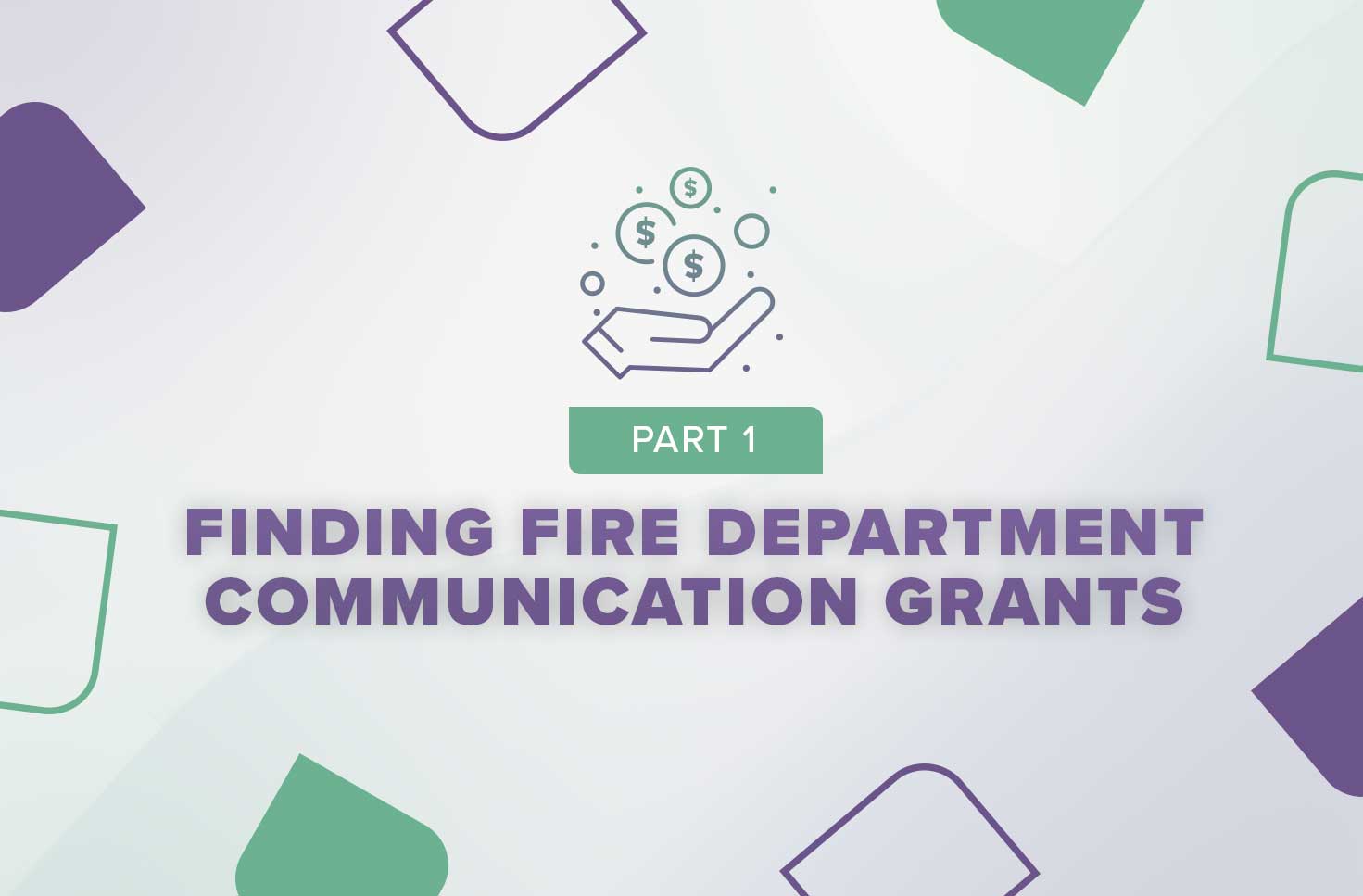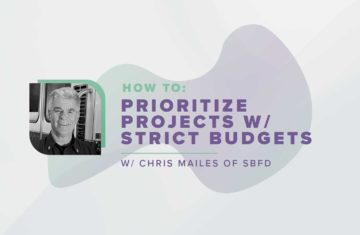Finding Fire Department Communications Grants
Introduction
An essential factor for improving emergency response is to have a communications infrastructure that first responders can rely on 24/7 for real-time, mission-critical information. If your agency needs to upgrade the communications technology but is facing constrained budgets, consider finding grant funds to finance a new project. There are a variety of public and private funding sources available, and our guide to finding fire department communications grants is designed to help steer you in the right direction.
A suitable grant depends on the project goals, your agency’s current budget, and how you plan to sustain the communications technology costs after grant funding ends.
Of course, before you can begin the process of finding grants for new department technology you need to get buy-in for the project in the first place. If you are struggling with the best way to go about garnering support for your project, check out our article on How to Get Buy-in for New Department Technology.
When to start the research and factors to consider – the pre-planning phase
Funding challenges for public safety agencies are expected to persist, as is the need for more resilient and advanced communication technology. The reality is, agencies will need to invest in mission-critical communication infrastructure far into the future, which means that they will need to find grants and other funding sources to successfully finance these necessary investments. Before researching a grant source for a communication technology project, it is important to develop a fairly detailed budget proposal. Creating a budget is part of the pre-planning phase of the project, and is crucial for finding the right grant.
A positive result of establishing a budget is, you may find that your agency only needs funds to fill gaps for the project, however, it may show you that you will need to grant money for the entire life cycle of the new technology.
Considerations for developing a budget
In developing your budget for a proposed project, gather quotes from solution providers (include optimal and alternative solutions), as well as estimate costs for implementation, and ongoing costs for maintaining and upgrading the technology.
In developing your budget, also include estimates for staff resources needed to implement, oversee, and train other staff on the technology. Other budget considerations to estimate costs for are:
- Will staff learn the technology ‘on the job’ or outside of the normal work hours? If they will be trained outside of ‘normal’ hours, you will need to include overtime costs.
- What will the taxes be for the solution?
- What are the maintenance and warranty costs and what is the frequency of these costs?
- What are the costs for upgrading the technology, and how often will there be upgrades?
- Are there interoperability factors? If so, what are the costs associated with making the technology compatible with dependent systems?
Research grant options – federal, state, and private/corporate
After you create a detailed budget, you can start researching the grants available that will fit your agency’s needs and circumstances. Depending on the granting entity, grants usually fund from one year up to three years. Consider how long your agency will need to be funded and how you will pay for the technology over the course of the technology’s life cycle. To find grants for a communications technology project try the following ‘tried and true’ methods for defining your search parameters:
- Think about what federal, state, or private entity would be interested in funding your type of project. For example, look at the American Rescue Plan (ARP) that is providing $350 billion to help states, counties, cities and tribal governments to finance increased expenditures, replenish lost revenue, and mitigate economic harm from the COVID-19 pandemic. ARP has allocated additional funds in the bill that may help the first responder community to invest in communications systems.
- Research how other agencies with similar projects found funding. Find out who the funders were for the similar projects and how the funds were used.
Use grant search engines specific to fire and emergency, or public safety. Fire Grants Help and First Responder Grants are specifically geared to first responders and offer an abundance of grant information and grant advice.
Funding Resources to Explore
Federal Grants
Federal grants can provide funding for a variety of programs and equipment, and usually offer large funding dollars. Look directly at government agencies like the U.S. Fire Administration, the U.S. Department of Commerce’s National Institute of Standards and Technology (NIST), the U.S. Department of Homeland Security, and the Federal Emergency Management Agency (FEMA).
Additionally, use the following grant search engines:
Grants.gov
USAspending.gov
Catalog of Federal Domestic Assistance (CFDA)
State and Local Grants
As part of your grant research, investigate at the state or local level. Grants from states come from a variety of sources and are typically mandated by legislation. State grants can originate from federal grants awarded to states to use for specific reasons, which may include emergency response efforts.
State and local grants provide first responders with the coverage, capacity, and capabilities they need to protect and serve their specific communities. Research your state’s Department of Public Health and Environment, the Department of Homeland Security for your region, or your state’s department of public safety for a grant that would be aligned to your specific region.
Private or Foundation Grants
Private or foundation grants are distributed through private companies, associations, and organizations. Look at community-focused foundations, associations, or companies who are aligned to your communications technology project or overall project’s mission. Also, research regionally specific emergency/fire responder associations, and public safety associations. In looking for a private or foundation grant, think in terms of who would be a good community partner for your project and who is as invested in your outcomes as your agency is.
Assessing if a grant opportunity would be a good fit for your project
After you find a few potential grant opportunities, called a Solicitation for Grant Application (SGA) or request for proposal (RFP) that may align to your communications technology needs, there are key areas of a solicitation or grant announcement that you will want to review to help you decide if you should pursue a grant.
- Summary of the grant – Assess if the grant opportunity fits with your overall idea and need. Does it align with your agency’s mission and goals? Also, consider if there’s an over-arching impetus for the grant’s purpose, such as the granting entity is looking to fund fire/EMS agencies that are striving for a specific community outcome or demonstrate through data that there’s a true need for the project.
- Eligibility – Does your agency qualify under the eligibility requirements? In some cases, a funder may require a larger regional government agency to be the lead on a grant application. In this case, you could contact the larger government entity to pursue a partnership to apply for the grant.
- Allowable ways to spend the grant money – In reviewing a grant’s solicitation requirements see if there are stipulations for if you need to use the funding dollars for equipment versus software or a new training program. There may also be an ‘in-kind’ requirement where an agency may have to contribute department dollars for certain costs associated with the project.
- Deadline – Consider if you have enough time to pull together a plan and develop a proposal. Don’t dismiss a grant if the due date has passed. It is likely that it will be released again the following year around the same time, so keep it on your radar and start preparing in advance. Grant solicitations are often issued at similar times annually.
- Amount – Look at the minimum and maximum award amounts. Assess if the award amounts will cover all your costs in your budget or if you will need to find other financial backing to bridge some of the costs. Also, measure the value of the award amounts with the time you put into preparing the project plan and writing a proposal, and also the time it will take for managing the grant if awarded. If the grant requires more work than what the award seems to support, it might not be a strategic decision to apply.
- Number of Awards – It is also important to review the grant solicitation to see how many awards the funder is projecting to award. Knowing this information will help you to determine just how competitive the grant is.
Connecting the dots – prepare for applying
Keeping your communications technology is up-to-date is crucial for your agency’s stability. As economic impacts from Covid 19 continue into 2022, stay on top of grant opportunities that fit your agency’s goals and financial needs. After you have identified some grant opportunities that may fit, prepare your agency for success by:
- Registering for the System for Award Management (SAM), if you are applying for a federal grant. If you have already registered for a previous grant, make sure that your registration is current. Visit SAM.gov. Don’t delay in registering! The process can take up to 25 days for registration approval.
- Building and maintaining relationships with community leaders and funding agencies. Share your passion for your project ideas and develop advocates for your needs.
- Starting to plan and prepare the grant application(s) project narrative, and continuing to refine your budget proposal.



